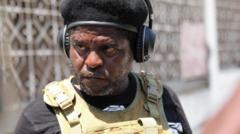**Two separate, deadly attacks in Colombia have resulted in at least 18 fatalities and numerous injuries, raising alarms about ongoing security threats linked to armed factions.**
**Wave of Violence in Colombia: Multiple Attacks Leave 18 Dead**

**Wave of Violence in Colombia: Multiple Attacks Leave 18 Dead**
**Colombia faces a surge in violence as a car bomb and drone strike shock citizens, stirring fears ahead of upcoming elections.**
In a grim escalation of violence, Colombia has mourned the loss of at least 18 lives following a pair of brutal assaults attributed to dissident factions of the former Revolutionary Armed Forces of Colombia (FARC). The first incident occurred in the bustling city of Cali, where a car bomb exploded, claiming the lives of six individuals and injuring over 60 others. The explosion, which happened on a busy street, sent shockwaves through the community, damaging nearby homes and resulting in widespread panic among civilians. Eyewitness accounts described the blast as a "thunderous sound" that resonated near the Marco Fidel Suarez Military Aviation School.
Not long after, a drone attack targeted a police helicopter on a mission to eliminate coca crops outside Medellin, resulting in the tragic deaths of 12 officers aboard. This latest assault has been linked to the largest offshoot of the FARC, known as the Eastern Command (EMC). In response to the chaos, Cali's mayor, Alejandro Eder, imposed martial law and initiated a temporary ban on large trucks entering the city. He urged residents to share any information about the attacks, offering a significant reward to help authorities.
Colombian President Gustavo Petro, alongside military leaders, has vowed to take decisive action, promising to convene a security council aimed at implementing additional protections for the populace. The Ministry of Defense has publicly condemned the attacks, declaring that the state will not capitulate to terrorism. This recent outbreak of violence underscores the fragile state of peace in Colombia, particularly as the nation approaches crucial elections anticipated for next year. The stark increase in violent incidents, especially involving drone warfare, signals a dangerous trend as armed groups vie for control amidst shifting dynamics in the drug trade. With political tensions already high, the nation remains on edge, watching apprehensively as the challenges to safety and security grow more severe.
Not long after, a drone attack targeted a police helicopter on a mission to eliminate coca crops outside Medellin, resulting in the tragic deaths of 12 officers aboard. This latest assault has been linked to the largest offshoot of the FARC, known as the Eastern Command (EMC). In response to the chaos, Cali's mayor, Alejandro Eder, imposed martial law and initiated a temporary ban on large trucks entering the city. He urged residents to share any information about the attacks, offering a significant reward to help authorities.
Colombian President Gustavo Petro, alongside military leaders, has vowed to take decisive action, promising to convene a security council aimed at implementing additional protections for the populace. The Ministry of Defense has publicly condemned the attacks, declaring that the state will not capitulate to terrorism. This recent outbreak of violence underscores the fragile state of peace in Colombia, particularly as the nation approaches crucial elections anticipated for next year. The stark increase in violent incidents, especially involving drone warfare, signals a dangerous trend as armed groups vie for control amidst shifting dynamics in the drug trade. With political tensions already high, the nation remains on edge, watching apprehensively as the challenges to safety and security grow more severe.





















